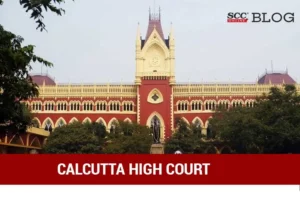Calcutta High Court: In the appeals challenging convictions under Sections 395, 396, 376, and 354 of IPC in a dacoity incident where the appellants are contending false implication, lack of corroboration, and inadequacy of evidence and prosecution is asserting on witness consistency and voluntariness of the confession, a division bench comprising of Sugato Majumdar and Tapabrata Chakraborty,* JJ., after reviewing the findings of the lower court, held that there was no ground for interference, and dismissed the criminal appeals filed by the appellants.
Brief Facts
The prosecution’s case alleged that on 06-02-2003, armed miscreants boarded buses near Aishmali and looted passengers, resulting in the death of the bus driver. Charges were framed against the appellants. Later a complaint by complainant led to the registration of a case under Section 396 of IPC. The prosecution presented evidence, including a judicial confession by Kurban, identification in test identification parades, and recovery of items. The Court acquitted 17 accused but found 5 accused guilty under Sections 395 and 396, with one additionally convicted under Section 376, and other under Section 354 of IPC. The appellants filed criminal appeals challenging the judgment dated 31-03-2009 passed by the Additional Sessions Judge convicting them under Sections 395, 396 and 376 of IPC.
Defence-Appellants’ Contentions
The appellant contended that there exists a lack of independent witnesses, inconsistency in the complainant’s version, and absence of corroboration suggest false implication. It was contended that confession of one accused, being retracted, should not be the sole basis for conviction. The appellant criticised the reliance on identification evidence and argued against the adequacy of light for identification and questioned the reliance on the victim’s delayed rape disclosure. It was argued that the absence of recovery and failure to establish criminal conspiracy further weakened the case. It was further contended that the acquittal of 17 accused raises doubt about the entire prosecution case.
Prosecution-Respondent’s Response
The respondent contended that the witness consistency and details in the complaint support the prosecution’s case. It was contended that identification in court, medical evidence, and the voluntary nature of confession of one accused strengthen the prosecution’s position. It was further contended that the abscondence of some accused doesn’t negate the offense of dacoity under Section 391 IPC.
Court’s Assessment
The Court observed that the present case involves five distinct incidents on a fateful date, incidents related to bus numbers WB-51/2658, WB-51/2733, Tata Sumo vehicle no. WB51/3284, an auto-van, and two cyclists. The Court stated that identification of the accused during test identification parade by witnesses as well as dock identification, serves as crucial evidence. The Court observed that the contemporaneous sequence of events, as corroborated by witnesses (helpers of buses, cyclists, and Tata Sumo vehicle boarders), strengthens the prosecution’s case. The Court asserted that involvement of more than five persons in the alleged incident is substantially established through consistent statements of various witnesses.
The Court observed that the driver of the first bus was found murdered, and post-mortem examination confirmed the bus driver’s death is due to a bullet injury, establishing the homicidal nature of the injury and supporting the prosecution’s case. The Court discounted the discrepancies in witness statements and alleged impossibility of identification due to switched-off bus lights based on the evidence on record. The Court found the confession of one of the accused credible and trustworthy, meeting the requirements of Section 313 of the CrPC and It emphasised that if the confession is deemed true and voluntary, it can be the basis for conviction.
Rejecting the defense’s challenge, to the conviction under Section 376 IPC stating that the medical evidence did not corroborate the victim’s testimony, the Court reasoned that though the medical examination occurred about a month after the incident, but the evidence of hymen rupture and other evidence are supported by other witnesses. The Court distinguished the present case from others cited by the appellants, emphasising the credibility of witnesses and the totality of evidence. The Court, after reviewing the findings of the lower court, concluded that there was no ground for interference.
Court’s Decision
The Court dismissed the criminal appeals (CRA 369 of 2009, CRA 520 of 2012, and CRA 114 of 2020) and all connected applications, upholding the findings of the lower court. No order as to costs is issued.
[In Re: Kurban Ali Mondal, 2024 SCC OnLine Cal 3, order dated 03-01-2024]
*Judgment by Justice Tapabrata Chakraborty
Advocates who appeared in this case :
Mr. Sumanta Chakraborty, Counsel for the Appellant [in CRA 114 of 2020]
Mr. Sudipto Moitra, Mr. Kallol Mondal, Mr. Krishan Ray, Mr. Souvik Das, Ms. Anamitra Banerjee, Mr. Dwaipayan Biswas, Counsel for the Appellant [in CRA 369 of 2009 and CRA 520 of 2012]
Mr. Swapan Banerjee, Mr. Suman De, Counsel for the Respondent/State

